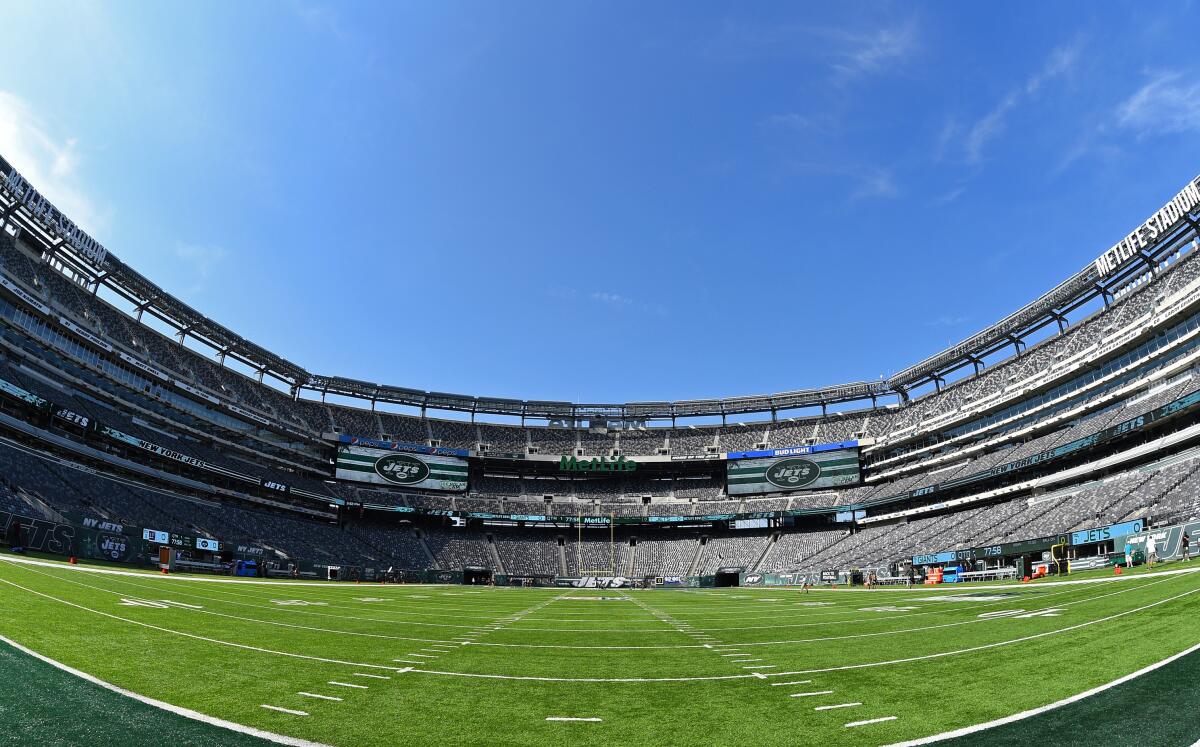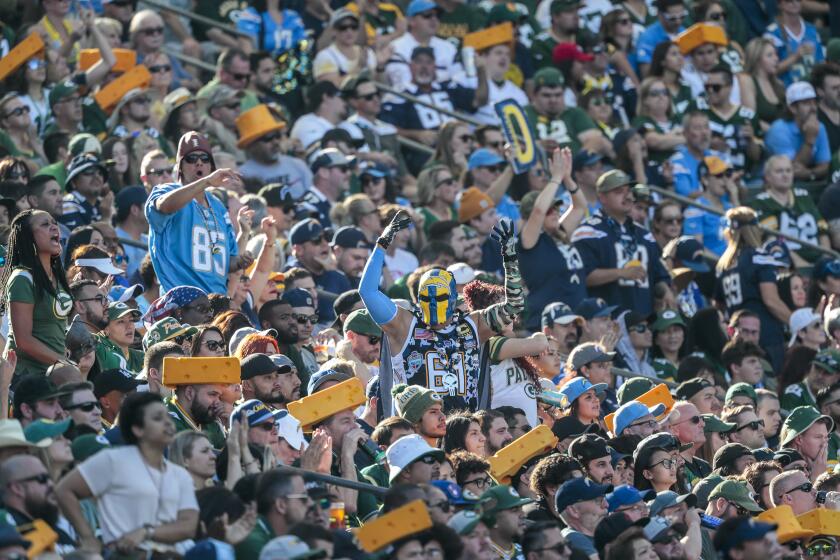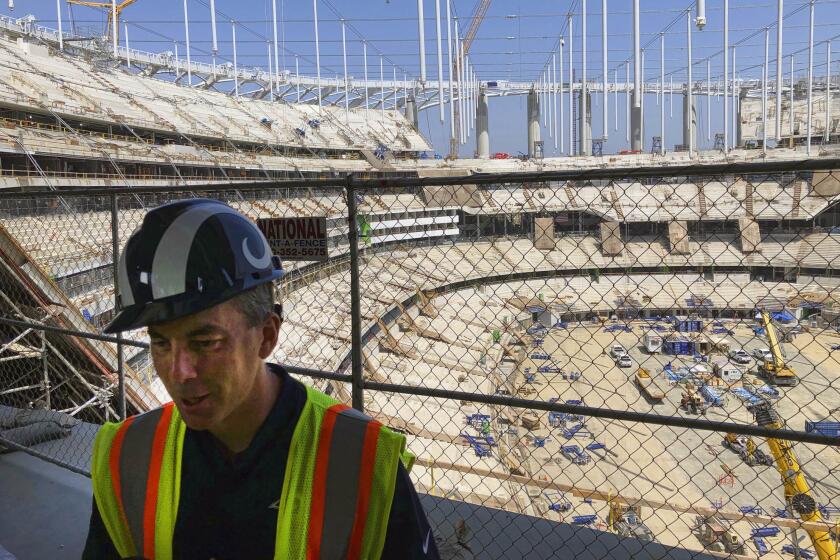Column: Chargers alert! Jets recall when they were second-class citizens at Giants Stadium

- Share via
The New York Giants and Jets, who play each other Sunday in their shared stadium, can provide a blueprint — or maybe greenprint — for the Rams and Chargers, who next fall will move into their $5-billion football palace, SoFi Stadium in Inglewood.
Giants-Jets doesn’t happen often in the regular season. It’s the 14th time the teams have met, other than exhibition games, and the third time since MetLife Stadium opened in 2010.
The teams are the oddest New York roommates since Felix and Oscar, even though their home is actually across the Hudson in East Rutherford, N.J. At times, the friction between the organizations has been palpable, especially when the Jets were tenants at Giants Stadium from 1984-2009.
“The Giants organization was much more corporate, much more buttoned-up,” said kicker Jay Feely, who played two seasons for both the Giants and Jets. “Jets, whether it was because of the stadium or whatever, there was always this mentality that you were kind of the little brother. You’re always fighting against that mentality, and it carried over into the dynamics of the organizations themselves.”
That has changed since the teams moved into their current home, where the clubs have split all stadium costs down the middle. What often felt like an inferiority complex has softened over the years.
The Rams and Chargers are entering choppy waters that won’t always be easy to navigate. Their arrangement is similar to the Jets and Giants at the old stadium, because the Inglewood stadium would not have happened without Kroenke, who in 2016 moved the Rams from St. Louis.
This venue is Kroenke’s legacy, the Stan Canyon. The Chargers are tenants.
Chargers owner Dean Spanos says the team has no interest in moving from L.A. after a report says the NFL is looking into a possible London relocation.
In a deal hammered out by the NFL and Kroenke, the Chargers pay $1 annually in rent, and bring with them 10 games per season, a $200-million league loan, and whatever they can raise in seat-license sales. In exchange, the Chargers get a glistening new place to call home, and share in a portion of stadium sponsorships and annual suite payments.
It’s Kroenke who is responsible for construction costs, and pitches in an identical loan from the league as well as Rams seat-license sales. Besides the stadium money on a Chargers game day, and aforementioned share of sponsorships and suites, Kroenke receives all other revenue generated by the 298-acre site throughout the year.
In their years of contemplating a move north to Los Angeles, the Chargers repeatedly voiced a concern: If they were to share a new home, they wouldn’t want to be the Jets playing in Giants Stadium. And for good reason. The Jets unquestionably felt like second-class citizens in a place where “Giants Stadium” was printed on their tickets, and the team bus parked under a sign that read the same. The Jets referred to the place as The Meadowlands, but the name never really stuck. The Giants’ locker room was bigger and more plush.
“Mr. Hess tried to do everything he could,” former Jets quarterback Ken O’Brien said of the late Leon Hess, oil magnate and owner of the Jets at the time. “He put up his Hess signs in the end zone and all throughout the stadium, but it still pretty obviously belonged to the Giants. They had been there first and played there. It was what it was.”
Like O’Brien, a lot of the other Jets players learned to block it out and just play.
“Although the stadium was blue, it didn’t really register like that to me,” said former USC and Jets star Keyshawn Johnson, now an ESPN analyst. “Because a field’s a field. Everybody that was inside the stadium was Jet fans, and we had our own facility. So we didn’t share practice facilities with the Giants, we just shared a stadium, as if we were going to a neutral site.”
The Chargers say they’re committed to staying, but it’ll be an uphill battle to win their Fight for L.A. This 5-step plan gives them a fighting chance.
As part of the agreement between the Rams and the Chargers, both teams will have identical locker rooms — and separate and identical visiting-team locker rooms — as well as identical owner’s suites. The Rams will have the east sideline on game day, and the Chargers will have the west, each team nearest to its locker room.
Because all the advertising will be digital at SoFi Stadium, a flip of the switch will transform the place from Rams to Chargers.
NFL Commissioner Roger Goodell probably was especially sensitive when helping craft the arrangement because he started his career at the league as an intern with the Jets. He understands how it feels to be the other team.
Without question, the Jets were the other team. But sometimes they got their day in the sun. Those days came when the Jets played host to the Giants, and the stadium was a roiling sea of green.
“I remember running out of the tunnel at our own stadium, and everything is green, people are booing at you,” former Giants tight end Brian Saxton recalled. “Wait a minute … Oh, that’s right, it’s a Jet home game. It’s like when you were a kid and you have family coming in for the holidays, and your parents kick you out of your room. So now you’re in a sleeping bag on the floor. So you’re home, but you’re not at home at your home.”
The problem with calling the Chargers renters and needling them with chants of “pay your rent” is that they aren’t alone.
The Giants must have felt that way on Christmas Eve in 2011, the first time they faced each other in their new stadium. It was a Jets home game, so, to make the place more comfortable for them, team employees used black curtains to cover a mural of the Lombardi Trophies outside the Giants’ locker room.
The Giants would have none of that and moved the curtains aside. The Jets came into that game with some hope of making the playoffs. However, the Giants broke their spirit with a 99-yard touchdown by receiver Victor Cruz, the highlight of a 35-24 victory, and the Jets haven’t been a playoff contender since.
Lots of people remember the small-minded gesture by the Jets, and the devastating response by the Giants, who went on to collect their fourth Super Bowl victory.
Petty, and the heartbreakers.
More to Read
Go beyond the scoreboard
Get the latest on L.A.'s teams in the daily Sports Report newsletter.
You may occasionally receive promotional content from the Los Angeles Times.














